|
|
|
|
|
|
|
|
Classical Source, January 2008 |
| Written by Mansel Stimpson |
Balancing Act: Jonas Kaufmann on Being Alfredo in La Traviata
|
| The German tenor discusses performing in
opera and his role as Alfredo at Covent Garden… |
|
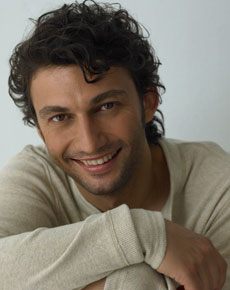 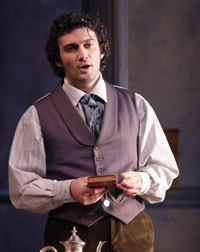 This
is the first time that Jonas Kaufmann has appeared in Richard Eyre’s
much-admired production of La traviata, currently revived (January and
February 2008) at Covent Garden by Patrick Young. However it is an opera
with which Kaufmann has long been familiar. One production marked his debut
at the Metropolitan, New York, but he had earlier done it in places such as
Zurich, Stuttgart and Chicago and he appeared as Alfredo last year in Paris
and Milan. Given this background, it is natural to ask him if his attitude
to the role has changed over time and whether or not the directors in whose
productions of it he has featured had a broadly similar approach. This
is the first time that Jonas Kaufmann has appeared in Richard Eyre’s
much-admired production of La traviata, currently revived (January and
February 2008) at Covent Garden by Patrick Young. However it is an opera
with which Kaufmann has long been familiar. One production marked his debut
at the Metropolitan, New York, but he had earlier done it in places such as
Zurich, Stuttgart and Chicago and he appeared as Alfredo last year in Paris
and Milan. Given this background, it is natural to ask him if his attitude
to the role has changed over time and whether or not the directors in whose
productions of it he has featured had a broadly similar approach.
Jonas’s initial comments rather took me by surprise. Most of us are familiar
with the plot of La traviata which was based on Dumas fils’s play La Dame
aux camélias. There’s no doubt but that our sympathy goes out to Violetta
Valéry the Parisian courtesan who turns her back on her previous life for
love of Alfredo but is later persuaded by Alfredo’s father to break off from
his son and thus to sacrifice her love. This is required of her because the
scandalous nature of their relationship is likely to result in the
forthcoming marriage of Alfredo’s sister being called off. Violetta’s return
to her former milieu is interpreted by the angry and jealous Alfredo as
rejection. It suggests to him that she had never truly loved him and
consequently when their paths cross again he goes out of his way to insult
and humiliate her. Leaving aside that we know that Violetta has a disease
that will result in her early death, it is certainly the case that Alfredo’s
behaviour is extremely unappealing. Nevertheless, given his ignorance of the
truth, it is something that we can understand, and all the more so because
we recognise that it stems from hurt (he had indeed loved Violetta deeply).
Despite these mitigating factors, Jonas takes a tough line on Alfredo.
“What is problematic for me here is finding positive and sympathetic sides
to the character. It’s not easy because if you consider Alfredo seriously
you realise that he’s either naive and inexperienced – which I like to think
is the case – or else he is just dumb in his failure to recognise what
Violetta gives up. It’s even worse when he goes on to revenge himself by
pulling the carpet from under her – an act that he does in public so that
there’s nothing left for her but to go away and die alone. So at first I
found it difficult to play this character and to really like him. But in
time I found several points where you can do that, where you can forget
about what he has done. That’s because
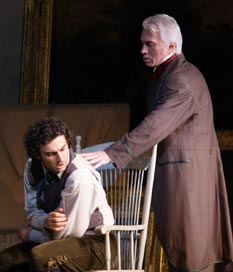 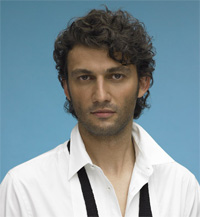 there
is so much emotion coming into it. there
is so much emotion coming into it.
“That said, however, I have to admit that the scene I’m most enjoying is the
one where he’s behaving badly and humiliating Violetta in front of
everybody. The reason that I love that scene is because it is brilliant
musically. There may possibly be another factor, in that some people have
suggested that playing in opera can be paid psychotherapy – by which they
mean that you can live out all sides of yourself, the bad as well as the
good and without being punished for it. So maybe it enables you to play the
evil aspect and somehow enjoy it! But, whatever your views on that, it is
the key scene when it comes to bringing character to the role. Earlier in
the first Act Alfredo shows shyness and then devotion after which, in the
first scene of the second Act, he’s flying high at the start and cast-down
at the close. But there’s no real challenge in any of that: it’s this
following scene that is the most thrilling to do due to its mixture of
holding back and letting go.”
Having indicated his general view of the character, Jonas then discusses the
contrasting approaches of those who have directed him in it. “I would say
that the most conservative production was the one at the Met by Franco
Zeffirelli. He gave the impression that he was trying to do a re-make of his
movie version, which wasn’t the best approach. It was gorgeous, of course,
but that meant that the only thing that the audience was talking about was
the brilliant decor and costumes and not the emotions experienced by the
characters. I felt that I had to fight the whole evening just to be seen by
the audience. At the opposite extreme was Christoph Marthaler’s contemporary
production of it in Paris. He already has a reputation for doing crazy
things, but I enjoyed it a lot. The approach may have been strange but it
resulted in my finding other angles and other aspects to Alfredo that I had
never seen before and the truth in those details was such that it meant that
they were not particular to that production but something you could make use
of in other stagings. However, there can be a danger in that if it results
in you simply repeating yourself: you should never fall back on reprising
something you’ve done before just because a fresh director is failing to
give you new ideas.”
Although Jonas has known the Russian soprano Anna Netrebko for some time the
present production marks the first time that he has performed with her. My
meeting with Jonas took place after the final dress rehearsal, which I
attended. Although that last rehearsal is the occasion when the cast
discover the response of an audience, Jonas tells me that artists always
tell themselves that the dress rehearsal doesn’t really count, but honesty
compels him to add the comment “although actually it does”. Nevertheless,
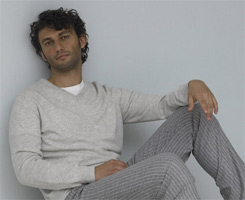 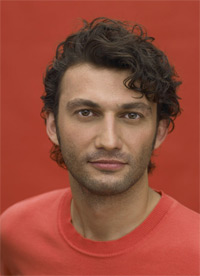 while
recognising that his interpretation of Alfredo this time around will be
influenced by Anna (Violetta), Jonas does feel that it is too soon to
comment in detail on the interaction between them. “That becomes significant
in a performance when you both recognise that something has made it stronger
or more intense. When the chemistry is right you find that your partner
gives you an idea and in that instant you act on it. With Anna that is very
likely to happen because she does something different every single time.
Since I am aware of that, I am myself ready to change in response to what
she is doing and I have to say that she is really, really brilliant: in this
part especially she is fabulous.” while
recognising that his interpretation of Alfredo this time around will be
influenced by Anna (Violetta), Jonas does feel that it is too soon to
comment in detail on the interaction between them. “That becomes significant
in a performance when you both recognise that something has made it stronger
or more intense. When the chemistry is right you find that your partner
gives you an idea and in that instant you act on it. With Anna that is very
likely to happen because she does something different every single time.
Since I am aware of that, I am myself ready to change in response to what
she is doing and I have to say that she is really, really brilliant: in this
part especially she is fabulous.”
This sense of living in the moment so as to feel the emotion of a role is at
the heart of Jonas’s approach to opera but he is very aware of the need to
find the right balance, that is to say the extent to which you need to
retain control while also achieving a deep sense of identification with your
role that nevertheless stops the right side of losing yourself in the part.
“If you are inexperienced that identification can drive you into something
that is uncontrollable. That may be better than being too cool, too calm,
but in very demanding roles it can become dangerous. The role of Otello (in
Verdi’s opera) is the most obvious example of that danger, but it also
applies to Don José whose emotions in Carmen go very deep. Experience helps
you to discover just how much you can give while still having something deep
inside that retains control. Without that it would indeed be dangerous, not
just for the voice but for your partner. You’re hardly likely to kill
somebody when your character is supposed to commit murder but without that
control there could be enough reality in the make-believe for you to cause
hurt. Of course, if it went that far the audience would sense that something
was wrong, but the need to feel the emotions of your character from within
while also keeping control is a fine line and one that can be quite tricky.”
Before bringing the interview to a close, I am able to congratulate Jonas by
expressing my admiration for what had been achieved at the dress rehearsal.
I tell him that this is the third time that I have seen Richard Eyre’s
production and feel that the present cast headed by Anna, Jonas and Dmitri
Hvorostovsky who plays Giorgio Germont, Alfredo’s father, is by far the best
that I have witnessed. In particular, I praise the treatment of the duet
between Anna and himself in the last Act. This is when Alfredo encourages
the dying Violetta to imagine that she will live and be able to go away with
him. This final Act of La traviata is so consistently sad that it gains
immensely if you can find a way of varying its presentation at some point
and I have never heard this part of the opera so effectively realised.
“After their reunion portrayed in that big music indicating their happiness
at being together again, Violetta collapses and that opens Alfredo’s eyes to
her state of health. He has to recover from that within a bar or two of
music so that he can find a way to give her hope and, if possible, a new
strength. This is the duet ‘Parigi o cara’ and I’m sure that it can be
played in different ways. But in this production especially I think his
decision is to create this fantasy for her and I think that it can’t be
private enough. I sing it only for her. It’s so soft that you never know if
it is coming out to the audience, but you tell me that it drew you in and
that you felt that you were coming over the pit to us. If we can only focus
the attention of the audience like that then it works: it’s what we wanted
to do.” |
|
|
|
|
|
|
|
|
|
|
|
|
|
|
|
|
|
|